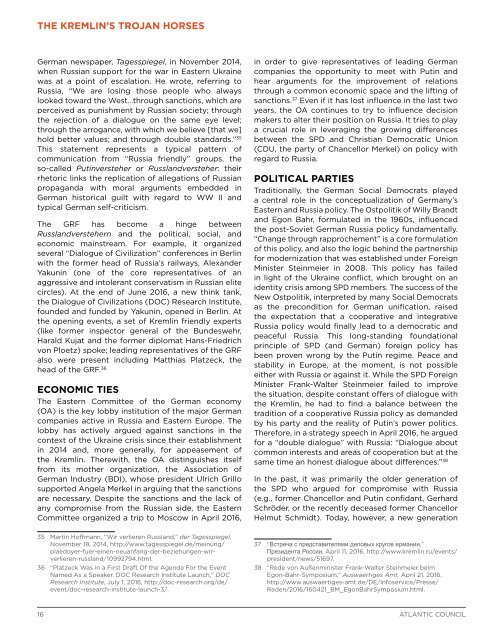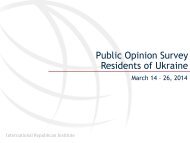Create successful ePaper yourself
Turn your PDF publications into a flip-book with our unique Google optimized e-Paper software.
THE <strong>KREMLIN’S</strong> <strong>TROJAN</strong> <strong>HORSES</strong><br />
German newspaper, Tagesspiegel, in November 2014,<br />
when Russian support for the war in Eastern Ukraine<br />
was at a point of escalation. He wrote, referring to<br />
Russia, “We are losing those people who always<br />
looked toward the West…through sanctions, which are<br />
perceived as punishment by Russian society; through<br />
the rejection of a dialogue on the same eye level;<br />
through the arrogance, with which we believe [that we]<br />
hold better values; and through double standards.” 35<br />
This statement represents a typical pattern of<br />
communication from “Russia friendly” groups, the<br />
so-called Putinversteher or Russlandversteher: their<br />
rhetoric links the replication of allegations of Russian<br />
propaganda with moral arguments embedded in<br />
German historical guilt with regard to WW II and<br />
typical German self-criticism.<br />
The GRF has become a hinge between<br />
Russlandverstehern and the political, social, and<br />
economic mainstream. For example, it organized<br />
several “Dialogue of Civilization” conferences in Berlin<br />
with the former head of Russia’s railways, Alexander<br />
Yakunin (one of the core representatives of an<br />
aggressive and intolerant conservatism in Russian elite<br />
circles). At the end of June 2016, a new think tank,<br />
the Dialogue of Civilizations (DOC) Research Institute,<br />
founded and funded by Yakunin, opened in Berlin. At<br />
the opening events, a set of Kremlin friendly experts<br />
(like former inspector general of the Bundeswehr,<br />
Harald Kujat and the former diplomat Hans-Friedrich<br />
von Ploetz) spoke; leading representatives of the GRF<br />
also were present including Matthias Platzeck, the<br />
head of the GRF. 36<br />
ECONOMIC TIES<br />
The Eastern Committee of the German economy<br />
(OA) is the key lobby institution of the major German<br />
companies active in Russia and Eastern Europe. The<br />
lobby has actively argued against sanctions in the<br />
context of the Ukraine crisis since their establishment<br />
in 2014 and, more generally, for appeasement of<br />
the Kremlin. Therewith, the OA distinguishes itself<br />
from its mother organization, the Association of<br />
German Industry (BDI), whose president Ulrich Grillo<br />
supported Angela Merkel in arguing that the sanctions<br />
are necessary. Despite the sanctions and the lack of<br />
any compromise from the Russian side, the Eastern<br />
Committee organized a trip to Moscow in April 2016,<br />
in order to give representatives of leading German<br />
companies the opportunity to meet with Putin and<br />
hear arguments for the improvement of relations<br />
through a common economic space and the lifting of<br />
sanctions. 37 Even if it has lost influence in the last two<br />
years, the OA continues to try to influence decision<br />
makers to alter their position on Russia. It tries to play<br />
a crucial role in leveraging the growing differences<br />
between the SPD and Christian Democratic Union<br />
(CDU, the party of Chancellor Merkel) on policy with<br />
regard to Russia.<br />
POLITICAL PARTIES<br />
Traditionally, the German Social Democrats played<br />
a central role in the conceptualization of Germany’s<br />
Eastern and Russia policy. The Ostpolitik of Willy Brandt<br />
and Egon Bahr, formulated in the 1960s, influenced<br />
the post-Soviet German Russia policy fundamentally.<br />
“Change through rapprochement” is a core formulation<br />
of this policy, and also the logic behind the partnership<br />
for modernization that was established under Foreign<br />
Minister Steinmeier in 2008. This policy has failed<br />
in light of the Ukraine conflict, which brought on an<br />
identity crisis among SPD members. The success of the<br />
New Ostpolitik, interpreted by many Social Democrats<br />
as the precondition for German unification, raised<br />
the expectation that a cooperative and integrative<br />
Russia policy would finally lead to a democratic and<br />
peaceful Russia. This long-standing foundational<br />
principle of SPD (and German) foreign policy has<br />
been proven wrong by the Putin regime. Peace and<br />
stability in Europe, at the moment, is not possible<br />
either with Russia or against it. While the SPD Foreign<br />
Minister Frank-Walter Steinmeier failed to improve<br />
the situation, despite constant offers of dialogue with<br />
the Kremlin, he had to find a balance between the<br />
tradition of a cooperative Russia policy as demanded<br />
by his party and the reality of Putin’s power politics.<br />
Therefore, in a strategy speech in April 2016, he argued<br />
for a “double dialogue” with Russia: “Dialogue about<br />
common interests and areas of cooperation but at the<br />
same time an honest dialogue about differences.” 38<br />
In the past, it was primarily the older generation of<br />
the SPD who argued for compromise with Russia<br />
(e.g., former Chancellor and Putin confidant, Gerhard<br />
Schröder, or the recently deceased former Chancellor<br />
Helmut Schmidt). Today, however, a new generation<br />
35 Martin Hoffmann, “Wir verlieren Russland,” der Tagesspiegel,<br />
November 18, 2014, http://www.tagesspiegel.de/meinung/<br />
plaedoyer-fuer-einen-neuanfang-der-beziehungen-wirverlieren-russland/10992794.html.<br />
36 “Platzeck Was in a First Draft Of the Agenda For the Event<br />
Named As a Speaker. DOC Research Institute Launch,” DOC<br />
Research Institute, July 1, 2016, http://doc-research.org/de/<br />
event/doc-research-institute-launch-3/.<br />
37 “Встреча с представителями деловых кругов ермании,”<br />
Президента России, April 11, 2016, http://www.kremlin.ru/events/<br />
president/news/51697.<br />
38 “Rede von Außenminister Frank-Walter Steinmeier beim<br />
Egon-Bahr-Symposium,” Auswaertiges Amt, April 21, 2016,<br />
http://www.auswaertiges-amt.de/DE/Infoservice/Presse/<br />
Reden/2016/160421_BM_EgonBahrSymposium.html.<br />
16 ATLANTIC COUNCIL



